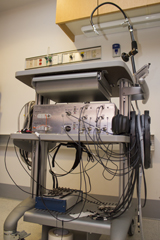Diffuse Optical Spectroscopy (DOS) & Diffuse Correlation Spectroscopy (DCS)
Diffuse Optical Spectroscopy (DOS) & Diffuse Correlation  Spectroscopy (DCS)
Spectroscopy (DCS)
Diffuse optical spectroscopy (DOS) is a method of noninvasive optical imaging used to examine relationship between light and matter through concentration levels of tissues and oxygen levels in the brain. There are multiple DOS techniques, but all use multi-wavelength, intensity modulated light to assess tissue absorption and tissue properties.
Diffuse correlation spectroscopy (DCS) is a varied, noninvasive technique used to measure cortical blood flow in cerebral tissue. DCS uses a laser to illuminate tissue with light, which allows researchers and clinicians to measures intensity fluctuations in blood cells. Some of this light also proliferates through the skull and into the brain, where it is scattered by red blood cells and in tissue before emerging from the tissues surface. This technique measures the scale of such cell activity by converting them to autocorrelation functions and fitting them to a correlation diffusion model.

